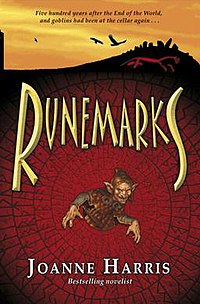I almost didn't read this book to be honest, the cover and the synopsis on the back did little to recommend it. Had it not been for the comments on Goodreads, which gave a greater detail of the story, I never would have read this book. If I were Harris, I would have been enraged at the person who wrote the synopsis because it gave no hint of the great story inside. Prepare yourself for some serious fanpoodling, you have been warned.
From the moment of her birth Maddy Smith had always been an outsider in the little rural community into which she had been born. Some five hundred years after Ragnarök mankind is now captivated by something called the word and people are told not to dream and most certainly not to perform any kind of magic. Born with a runemark on her hand Maddy is capable of performing various kinds of magic but she has no idea how much until one day in her 7th year she meets old one eye otherwise known as a good-for-nowt Outlander. Year after year he comes to her for a few weeks and tells her the stories of he Norse Gods as he teaches her various runemarks and how to harness her power. Being isolated Maddy spends in the time dreaming that the various Norse Gods are friends and famly to her.
One morning Maddy is called to Mrs. Scattergood's to deal with yet another goblin infestation in the cellar when this time she manages to catch and correctly name Sma-rakki. In an effort to capture hold him she lets loose all of the bilge and vermin in the area rise from depths. She quickly leaves the cellar knowing that they will disappear in an hour but the racket draws the attention of Adam Scattergood, as Maddie races off to meet with the Outlander. It is at this meeting that Maddy is observed by Adam and her secret ability to perform magic becomes known. The Outlander sends Maddy on a quest to find the Whisperer long buried in One Horse Hill while he stays behind to deal with the townsfolk. The Outlander tells Maddy not to trust anyone she meets, well aware of exactly what is at stake.
There is so much more to Maddy's quest than she realises. To be successful Maddy must heal the rift between the Æsir and the Vanir all the while gambling that Loki will not actually betray her. The Word feels that it's time for it to rule the world and will stop at nothing to cast aside the old Gods. It has gathered a host of followers amongst the folk and is determined to rule in Asgarde as the Gods of old once did. Can Maddy get them to leave the past as the past because the word represents not only a threat to their continued existence but to the nine worlds as well.
If you are a fan of Norse mythology, I suspect that this book will catch you from the very beginning of its epic tale. It is so clear that Harris did a lot of research to write this book, with everything from the mythos of the Gods themselves to the runemarks she uses throughout the book. Though familiar with many of the Gods who appeared in this story, Harris skillfully builds on their stories while keeping true to the original tales. I found myself warming to the healer Iðunn and the ease at which she managed to block out the most desperate circumstances. I laughed at Loki's antics and wondered when people would finally get wise to the fact that he is no good. I was saddened for Hel and her tireless pursuit of Baldr - a love destined to be forever unrequited as he sits in death next to her on his throne - a shadow of his former self. Harris brought them alive for me in a way that was new and eer so compelling.
As a protagonist Maddy just seemed to bumble from one disaster to the next, each time trying to fix her errors. She is easily manipulated except for when it comes to Loki who for some reason she seems to want and protect despite knowing his true nature. To some degree the fact that she is only 14 explains her naivety but I would have liked to see her be more active. I did however like that despite all that she was up against, she didn't give up and lay down and wait for Óðinn to save her. I think the problem is that the only other active female character in the story was Skaði and she was focused on revenge at all costs and didn't seem to see the forest through the trees. Harris did introduce Frigg but despite her importance in mythology she was a bit character at most. It is my hope that in the next story Frigg, Freyja, Iðunn, and Freyr will have a larger role to play. They seemed to be cast aside so that the men could play the hero.
There were no GLBT characters, or characters of colour in this story. This is very common when it comes to books based in Norse mythology but it would have been nice to see some inclusion, even if it was a cursory mention. Despite the erasure, I loved this story from beginning to end. Harris weaves a great tale that is a joy for any fan of Norse Mythology and I cannot wait to read the second book in this series.


